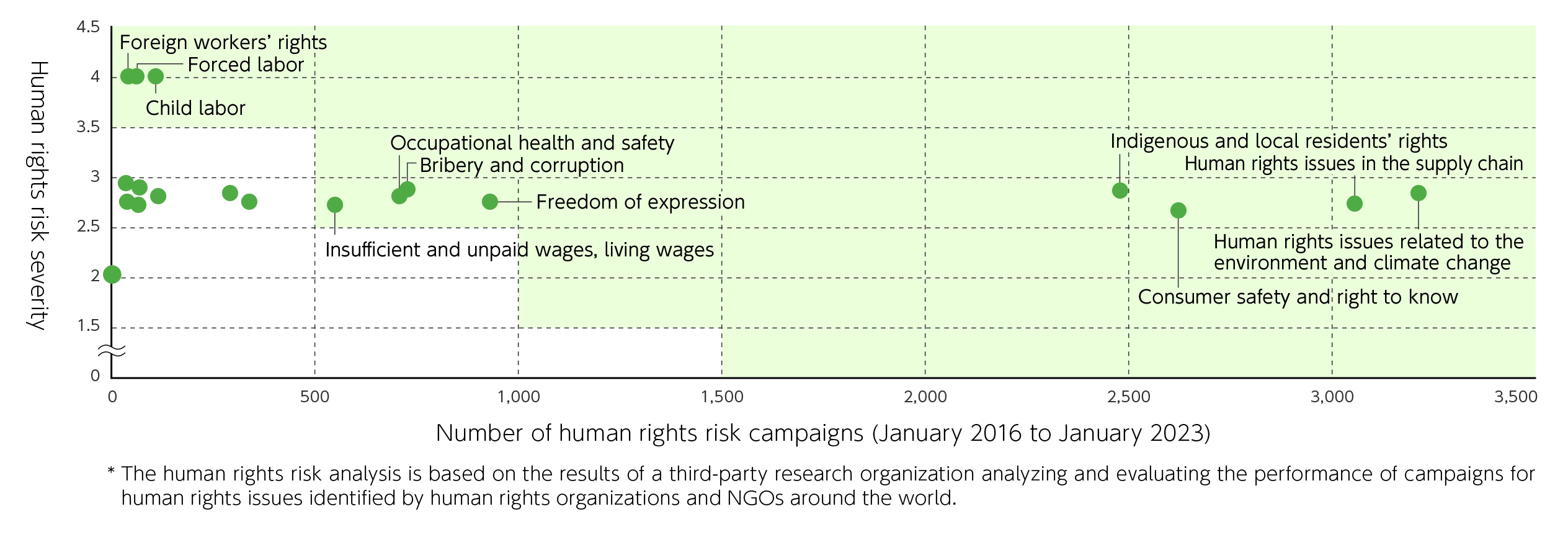Respect for Human Rights
Basic Approach to Human Rights
In June 2022, we formulated the human rights policy of the Hanwa
Group, which includes Hanwa and its subsidiaries.
Under this policy, we will promote human rights
initiatives and disclosure in the supply chain.
Hanwa Group Human Rights Policy
Hanwa and its subsidiaries (“the Group”) have a corporate
philosophy of responding to the diverse needs of customers and
contributing to society as a “distribution specialist.” Based
on this philosophy, we aim to realize a sustainable
international community and local community through our
business.
The Group, which operates in various countries around
the world, believes that respect for human rights is the
foundation of our business, and we will clarify this concept
in this policy and strive to fulfill this responsibility.
1.Scope of application
This policy applies to all officers and employees of the
Group.
We also expect our suppliers and other business partners
and other related parties to respect this policy.
2.Support for international norms and principles regarding human rights
The Group supports and respects international norms on human rights including the International Bill of Human Rights (Universal Declaration of Human Rights and International Covenants on Human Rights), which stipulates the basic human rights for all people around the world, and the ILO Declaration on Fundamental Principles and Rights at Work by the International Labour Organization (ILO), which stipulates the fundamental rights regarding labor (freedom of association and collective bargaining rights, the elimination of forced or compulsory labor, the abolition of child labor, and the elimination of discrimination in respect of employment and occupation). Also, the group supports and respects the Guiding Principles on Business and Human Rights endorsed by the UN Human Rights Council in 2011.
3.Human rights due diligence
The Group will endeavor to understand, prevent or mitigate the negative human rights impacts that may be caused through its business.
4.Remedy
If the Group's business activities cause or reveal a negative impact on human rights, we will work to correct them through appropriate procedures and dialogue.
5.Dialogue and discussion
The Group will hold dialogues and discussions with related stakeholders as appropriate in efforts in line with this policy.
6.Education and enlightenment
The Group will provide appropriate education to officers and employees and strive to prevent negative impacts on human rights.
7.Report
The Group will appropriately report on its efforts to respect human rights in this policy through various reports and websites.
June 24, 2022
Yoichi Nakagawa, President and Representative Director
Human Rights Risk Analysis
In analyzing human rights risks, we used two approaches based on the past six years of NGO campaign results.
(1)Approach from general information
The NGO campaign results include content related to a variety of commercial products. The following chart shows an analysis of the “human rights risk severity” and “number of human rights risk campaigns” for general campaign content regardless of commercial products, by the type of human rights that the campaign is promoting. Going forward, we will periodically analyze human rights risks to understand the details of human rights risks that we should pay attention to and utilize them in our various policies.

(2)Approach from product-specific information
Of the NGO campaign results pertaining to the campaign content of product-specific information (e.g., campaigns related to food production sites), the following chart shows an analysis of “human rights risk severity” and “number of human rights risk campaigns” by the type of such human rights promoted by the campaign and by our business.

(3)Summary of human rights risk analysis results
From (1) above, we identified “forced labor,” “child labor,” “insufficient and unpaid wages, living wages” and others as human rights issues that require more attention in the overall supply chain. From (2) above, we identified Primary Metal, Food Products, and Housing Materials (lumber) as businesses that should be given particular attention with regard to human rights issues. Going forward, we formulate procurement policies and approach business partners in light of the results of our human rights risk analysis.
Conducting Questionnaires
For the Primary Metals, Food Products, and Housing Materials (lumber) businesses that have been identified as businesses that require special attention based on the results of an analysis of human rights risks, we are sequentially conducting questionnaires on social and environmental aspects for business partners in these businesses in an aim to better understand actual conditions for business partners.
